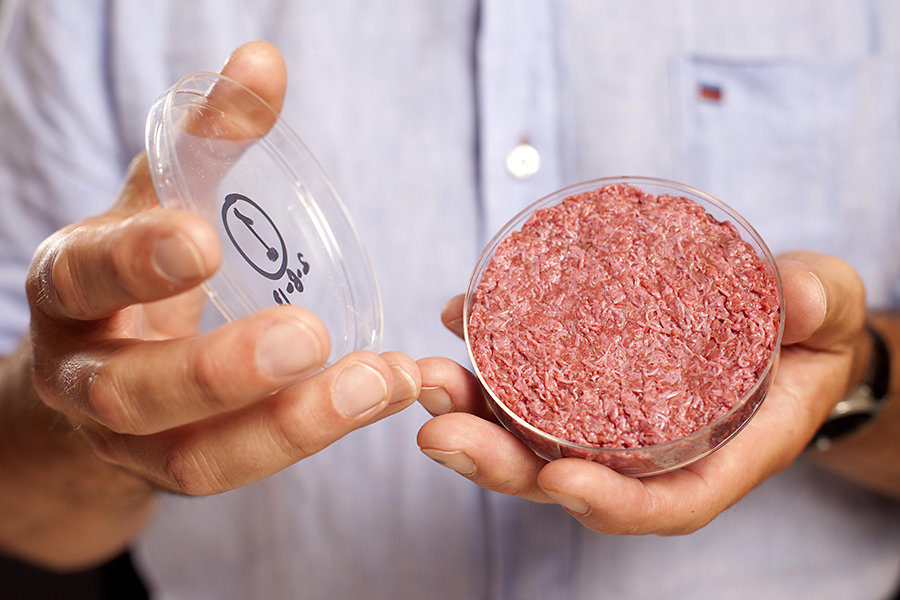AI: Science Burgers

If you haven’t been reading the news lately, you may have missed the hoopla surrounding the consumption of the world’s first lab-grown beef burger. Basically, scientists have spent hundreds of thousands of dollars and years to culture what is apparently a fairly bland burger (not enough fat, I presume).
The science behind cell culture and tissue engineering is amazing. Scientists have thus far been able to grow a trachea, bladders, and skin (by the way, that’s where all those leftover baby foreskins go). Personally, I have worked in a tissue engineering lab and it’s fun to culture cells and watch them grow (my little babies!), but for some reason I can’t get psyched up about this lab-grown burger.
Actually, there are many reasons:
- This burger is not (currently) an acceptable substitute for regular (meat-typical?) burgers. We already have plentiful protein sources for people who either don’t have access to meat or choose not to eat it. Bugs are a fantastic source of protein, as are beans. I get that some people would rather eat a burger than a crispy bug, but I don’t see lab-burgers being a reality in 10-20 years, as the head scientist is predicting.
- Lab-grown meat is (currently) not “cruelty-free.” In order to grow cells, you need to give them nutrients, and it turns out that a great source of nutrients is fetal bovine serum (harvested from the slaughterhouse). So, if you’re the kind of person who would welcome lab-grown meat because it doesn’t involve killing an animal, you may be shocked to realize it was soaked in serum from a cow fetus. (Disclaimer: I am a meat-eater, so I’m not judging anyone who eats meat.) There are substitutes for FBS but that is a whole other debate.
- The idea of eating a piece of muscle grown in a lab squicks me out way more than eating a regular burger. I don’t know why–maybe it’s just the idea of it? Maybe it’s the fact that I work in a lab and I handle cell culture media? Who knows. All I know is that the high-res photos of the cultured burger gives me the butt-willies (you know what that is, admit it).
Here is another excellent article about the flaws of lab-grown meat, written by another scientist who has done cell culture and understands its limitations.
So, on to the Inquisition part of this post. What are your thoughts on lab grown meat? Are you excited or skeptical about the meat-of-the-future claims? Are you grossed at the thought of eating this burger? Did you just now find out that cell culture involves using the blood of unborn calves?
I know we have some scientists in the audience so I would like to hear your opinion of this as well!
The Afternoon Inquisition (or AI) is a question posed to you, the Skepchick community. Look for it to appear Sundays, Tuesdays and Thursdays at 3pm (ish) ET.





More pragmatic issue: Is there a market for this? Vegans won’t eat it because it involves an animal product, in addition to the whole “forced ovulation” thing. Foodies right now don’t like “unnatural” ingredients. Even a health nut who doesn’t mind the unnatural would have to question why exactly embryos are healthier. And it’s not likely to be a new food for the poor; since this one requires slaughterhouses to provide the fetal serum anyway, a CAFO actually seems more elegant. (I never thought I’d say that.) I honestly can’t see who this is intended for.
Also, if cell culture is able to be automated to the scale needed to produce these burgers, wouldn’t it be better for making organs for patients who need them instead?
Engineering is not a zero sum game.
Gearing up to culture meat on an industrial scale is probably the best way to build out infrastructure to make replacement organs.
The real attraction is not going to be making hamburger, its going to be making designer meats that you otherwise could not get. If you don’t cook sous vide and use a rotovap to distill essences, you are probably not the target audience for this in the first wave.
Eventually, the whole production line will be automated and animal product free.
No one said it is. But resources are not unlimited, you know.
Seems to me that the best way to build out infrastructure to make replacement organs is to … make replacement organs……
Interesting point. You may be right (if this even catches on at all–something tells me it won’t).
How will it be animal product free? It is derived from stem cells, which come from animals.
>Engineering is not a zero sum game.
>>No one said it is. But resources are not unlimited, you know.
That is essentially false. With the Internet I can recruit more engineering effort to a project than Brunel had available to build the UK railway system or NASA had to put a man on the moon. Take a look at the Game of Thrones Minecraft world for an example.
In any case, society wastes the vast majority of its engineering resources. The Clinton boom was the result of the pentagon death machine being temporarily starved of funds which made the engineers available to recruit for the Internet boom.
Industrial cultured meat will pull resources from other bio fields but dramatically expand the cell culture field so that there are more undergrads and grad students being produced. It will also provide a source of funding that is not dependent on the government and the likes of George W. Bush wanting to pander to his witch doctor.
>>Gearing up to culture meat on an industrial scale is probably the best way to build out infrastructure to make replacement organs.
>Seems to me that the best way to build out infrastructure to make replacement organs is to … make replacement organs……
Making replacement organs is a much harder task than simply culturing the cells on an industrial scale. You have to make the organ work, you have to pass through trials, you have to make human organs in the end, you have to go through a huge amount of approvals.
To land a man on Mars you first land on the moon and to do that you first put a satellite in orbit.
>How will it be animal product free? It is derived from stem cells, which come from animals.
It depends on how choosy you want to be. If you stand near a cow you are going to be inhaling the odd cow cell or thousand. So why obsess over the initial stem cell? They can take them from animals that they don’t kill and live out happy and full lives as PR props.
@Phillip Hallam-Baker
“That is essentially false.”
OH? Thanks for letting me know that we have somehow invented unlimited resources! Glad to know that we will never run out.
I cannot take your argument seriously if you think producing cell cultures is as easy as making a GoT Minecraft.
How can you possibly know this? This is pure speculation. You must forgive me if I am skeptical considering the effects that industrial agriculture has had on our food sources, on family-owned farms, and on our health. And I don’t see how it will produce a source of funding that is government-free (as if that’s a bad thing? Are you against the NSF, NIH, NEH?).
You really don’t know much about vegans do you? And consuming products made from animals is not the same thing as inhaling cow farts. I cannot believe you seriously just tried to hand-wave away consuming products made from animals with breathing in the same air.
It’s not about “obsessing” over anything. It’s about not wanting to be part of a system that exploits both humans and non-human animals in horrendous ways that have negative effects on the environment. That it is “only a few stem cells” is not a difference for vegans because it is still exploiting animals for food sources that we don’t need to survive.
//Also, if cell culture is able to be automated to the scale needed to produce these burgers, wouldn’t it be better for making organs for patients who need them instead?//
I have to agree that this is a misguided zero sum argument. It’s akin to saying “why should we focus on space exploration when people are starving?” .
I’m not at all a biochemist, but I’m sure there are plenty of uses of this science.
No, it’s not akin to saying that at all. It’s more akin to saying “why should we focus on exploring Saturn’s rings, wouldn’t it be better if we focused on building a moon space station?” It’s a question of where limited resources should be directed. Funding for this type of research is not unlimited, you know.
Sometimes, devoting more resources to A results in more resources going to B too.
To take an example from space science:
US astronomers often complain about the huge budgets that NASA gets, of which a relative pittance goes to astrophysics and astronomy, with much of the budget going to manned space flight, robotic Solar System exploration, etc. Some people feel like the astrophysics part of NASA should be split off, so that NASA would handle manned space flight, and some other new organization would handle astronomy. But the European Space Agency (ESA) is a cautionary tale: ESA comes from a region with greater economic output than the US and spends far less on manned space flight. But ESA also spends less on space science, astronomy, etc. The lesson that many well-informed astronomers have drawn is that having such a large budget go to NASA (largely for manned space flight) creates more opportunities for space science to be funded, too, and that astronomers get more money from NASA than they probably would from a space-science-only governmental body.
Regarding meat and organs:
I don’t know, but it doesn’t seem crazy to me that having a large industry care about cell culturing will help bring about the day when we can reliably and cheaply grow replacement organs faster than if the food industry stays away from cell culturing.
If you were talking about government funded research, I’d agree with you, but this was funded privately by Sergey Brin at google, so the “limited resources” argument doesn’t apply when we’re talking about private individuals funding it (it would for government or public funding however). His resources aren’t so limited, and for all we know, he DOES indeed have his eyes on human organs.
And animal cell-culture research on this doesn’t take away from human research, it cross-polinates & re-enforces it.
Mind you I’m not advocating we throw money behind animal research, but I’m just saying there’s no good reason to chastise a private individual for funding interesting research. The more proper course of action I think would be to send an interesting scientific proposal to a rich individual to fund :D.
It would be better. And there have been advances in those regards.
I think producing organs that are viable for transplants is a larger more complex challenge than creating tissue that just needs to be cooked. And it is also easier to test. So it is no surprise that we are getting this frankenburger before the factory organs. I do hope that this is not the only use we find for this technology.
I think that if the frankenburger manages to really need less energy to produce, the meat industry will likely adopt it to save costs. Decades ago there was no market for corn syrup derivatives, the food industry can create a market for these things.
As soon as we get those Star Trek-style replicators up and running, I’m down for anything.
Replicator food is magic. Troi could eat all the chocolate sundaes she wanted!
Hey, thanks for the post! I’m also a scientist, I grow cells for a living, and I agree with some of your points. The first thing that came to my mind reading the news about the burger was the fetal bovine serum issue. I think now, it is possible to grow myogenic/muscle cultures without serum, but serum is currently the cheapest way to do it. Which means that you probably need to sacrifice more cows pr. gram of burger than if you just eat meat from an animal.
On the other hand, the thought of eating a lab-grown food item doesn’t gross me out at all, and I feel like it is because I know what the cell culture involves. However, why are we trying to imitate something that has already been perfected by evolution over millions of years? Why don’t we go more creative an make a NEW type of food? Something amazing that nobody’s eaten before? I think “fake” meat just sounds so boring!
Excellent points! Even though I don’t like the idea of eating bugs, if someone could find a way to market them so that they are palatable (without the mental ick factor), I’d like to see that.
TRAVESTY! If there is one thing the USA does better than anybody else in the world it has to be burgers. When I think of all the superb burgers I have sampled (shout out to L’il Woodies’ in Seattle)….I am speechless!
OK to Science. How about working on improving the flavour and texture of things like tofu? For instance, in the Buddhist monasteries, there is a whole existing tradition of making vegetarian meat lookalikes. It would seem a lot more practical and economical to work on something like that rather than start over again in a lab.
I don’t know if it’s available in your area, but I’ve heard good things about BeyondMeat (chicken substitute).
I’ll keep an eye out for that. actually there’s a whole lot of American food that I miss, It would be good to find a local source. There must be a store somewhere that caters for expats!
Getting way OT but I can’t see why your grape jelly is not a thing here, while peanut butter is well established. I would also dig to get some Sweet Baby Rae barbecue sauce… Heinz tomato sauce OTOH seems to be identical the world over.
My husband has some friends in Australia and he brought them real maple syrup. I think they were impressed. Also, if you ever visit the Southern US, we have a whole array of strictly-regional BBQ sauces (not usually found in stores). My home state is proud of it’s mustard-based sauce.
I’d also recommend Quorn, a high-protein fungus product, which has a very similar flavor and texture to chicken. Around where I live, it’s pretty easy to find in grocery stores. Also Smart Dogs, a textured vegetable protein “hot dog,” which my meat-eating girlfriend says are basically indistinguishable from normal hot dogs. But I’d also suggest approaching vegetarian high-protein foods not as meat substitutes, but as distinct foods. If tofu is supposed to be a meat substitute, it’s going to fail, but well-prepared tofu can be delicious in a way wholly distinct from meats. Same with seitan and veggie burgers. The best veggie burgers I’ve had make no attempt to taste anything like hamburgers, but bring something unique to the palate.
Very much this!
Great post, I think you raise a lot of good points that are usually lost in the discussion of this topic. I find it hard to get very excited about lab-grown meat for exactly the reasons you raise (except I don’t have too much of the squick-out factor on this one), although I am a pescetarian. In defense of the research, though, this kind of tissue engineering is still in rudimentary stages. Imagine pairing this with engineered tissues or microorganisms that produce the growth medium for the meat. Sunlight and nutrients go in, hamburgers come out. It doesn’t seem impossible that in a few decades we’d have the technology for this. Even that highly speculative sci-fi idea aside, though, I wonder how much of this is really just clever marketing to fund basic science in tissue engineering. Even if the ability to grow cow muscle tissue in a petri dish isn’t a viable idea as far as food production goes, they’re still improving their techniques at growing and manipulating tissues in the lab, which seems to have pretty obvious benefits for biomedical research.
Mary,
I heard about this recently. I meant to send you guys an email about it, but I kept forgetting too. I hope this helps solve world hunger. This could make the cost of meat much cheaper and let us use less land for cattle grazing, thus we could use that land for other purposes.
“cell culture involves using the blood of unborn calves”
That is the absolute most metal thing I have ever heard in my life.
Marketability to death metal fans aside, I wouldn’t really have an issue eating it. Between my job, hobbies and other obligations I pretty much only eat as a way to ward off hunger. My only two considerations with food choice is time and expense, time usually winning out over expense. As long as they can package it in such a way that it takes less than five minutes to prepare and eat and isn’t prohibitively expensive I’m fine with pretty much anything.
I wouldn’t mind trying bug meat though. I’m aware that meat is fairly problematic from a sustainability point of view, but most vegetarian options I’ve explored conflict with my first two rules of food (take too long, are too expensive) also, they tend to be loaded with flavoring, which I just plain can’t stand.
Crap. You’ve dashed my laboratory burger hopes.
There was an episode of “Better off Ted” in which Phil and Lem produce laboratory grown meat. (The process described in the show is remarkably like the real one, including electrical jolts to simulate muscle contractions.) In the show the taste tester concludes that it tastes like “despair…”
The biggest issue with meat at the moment is the ecological footprint of industrial agriculture. Theoretically lab grown meat could do better here, by not growing hooves, bones, gristle and offal, but I suspect lab-meat will always be for more finicky eaters than cows, and require far more resources to process whatever organisms actually producing the energy from sunlight. Producing consumer ready bug based protein would be a lot easier and more efficient.
Yes, but we’re not a hivemind. What in theory would be efficient is usually rejected by society.
The artificial-meat nutrition problem seems very serious to me — you need a complete set of amino acids and vitamins and the like, and to get them from plants, you’d need to digest protein-rich crops like soybeans.
There’s a kind of vat-grown fake meat that’s already in production. Quorn. It’s made from a soil fungus, Fusarium venenatum, that is grown in vats. That fungus only needs to eat glucose and various minerals — its nutritional needs are much simpler than those of just about all the animal kingdom — several “essential” amino acids and vitamins. Glucose can be made by digesting cellulose, meaning that one can feed that fungus ordinary grass if one wanted to. Eating fungus may seem gross, but guess what a mushroom is.